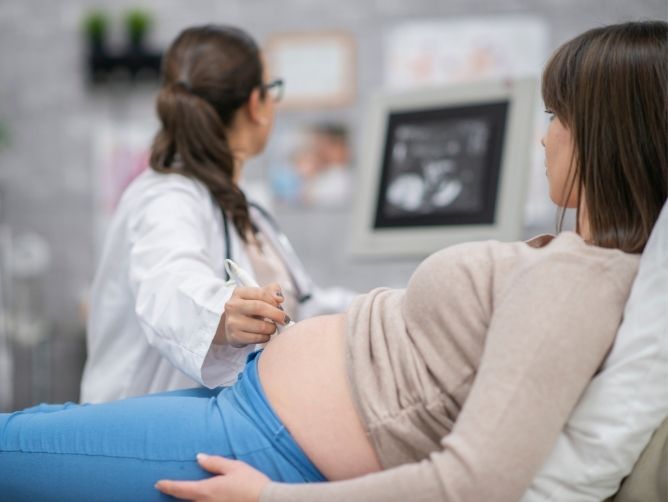Embarking on the journey of pregnancy can stir a whirlwind of emotions—from ecstatic joy to nagging anxiety. Especially when you hear the term “high-risk pregnancy,” a myriad of questions might flood your mind.
What exactly constitutes a high-risk pregnancy? Does it affect you or your loved ones? How do you navigate the challenges it presents? Before delving into panic or confusion, it’s essential to be informed.
This guide aims to shed light on the definition of a high-risk pregnancy, unravel the factors that lead to it, and provide a roadmap to navigate this unique journey.
Equipped with knowledge, you can better understand, manage, and find empowerment in your pregnancy experience, ensuring you’re well-prepared for the road ahead.
What Defines a High-Risk Pregnancy?

A high-risk pregnancy, as the term suggests, implies that there are higher chances of health complications for either the mother, the baby, or both during or after childbirth.
It’s essential to understand that a high-risk label doesn’t guarantee problems, but it does indicate a need for increased attention and care during the pregnancy period.
Several factors and conditions contribute to categorizing a pregnancy as high-risk. Some of these factors may be present before a woman becomes pregnant, while others may develop as the pregnancy progresses.
It’s also worth noting that a woman who has had a normal pregnancy before can still experience a high-risk pregnancy later on.
Common Factors Leading to High-Risk Pregnancies

Navigating the realm of pregnancy often leads to a plethora of questions, especially when faced with the term “high-risk pregnancy.” But what defines a pregnancy as high-risk, and what are the common factors contributing to it?
Understanding these elements not only empowers expecting mothers but also equips their support systems with essential knowledge.
Maternal Age
Maternal age stands as a pivotal factor in pregnancy risks. When women embark on motherhood at 35 or older, termed “advanced maternal age,” they encounter heightened risks such as gestational diabetes, preeclampsia, and chromosomal abnormalities.
Conversely, teenage pregnancies present their own set of hurdles. Medically, younger mothers might face preterm births and low birth weight issues.
Socioeconomically, they may grapple with limited resources and support, further complicating their pregnancy journey. Thus, age, at both ends of the spectrum, profoundly impacts the intricacies of childbirth.
Medical History
Medical history serves as a telling predictor in high-risk pregnancies. Past complications, be it preterm labor, preeclampsia, or gestational diabetes, can potentially recur, placing both mother and baby under increased vulnerability.
Additionally, surgical histories, especially those involving the reproductive organs, cast their own shadows on subsequent pregnancies. These prior interventions might impact the uterus’s ability to carry a pregnancy to term or affect its overall environment.
Hence, understanding and discussing one’s medical backdrop with healthcare professionals is paramount to foresee and manage potential challenges in pregnancy.
Multiple Pregnancies
Expecting multiple bundles of joy—be it twins, triplets, or more—undeniably brings heightened excitement but also categorizes the pregnancy as high-risk. The presence of multiple fetuses amplifies the chances of certain complications.
Preterm labor becomes more probable, given the increased strain on the uterus. The likelihood of preeclampsia, a condition marked by high blood pressure, also rises.
Additionally, other complications like gestational diabetes or placental issues might surface.
While the joy of multiple births is unparalleled, it’s crucial to be aware of and prepared for the potential challenges accompanying such pregnancies.
Chronic Health Conditions
Chronic health conditions can cast a significant impact on pregnancy outcomes. Pre-existing ailments such as hypertension, diabetes, kidney disorders, autoimmune diseases, and HIV introduce additional layers of complexity.
These conditions can affect how the body responds to pregnancy and may exacerbate certain risks, potentially compromising the health of both the mother and the baby.
Proactive management, under the vigilant eyes of healthcare professionals, becomes paramount. Regular monitoring and tailored medical strategies ensure that these conditions are kept in check, paving the way for a safer pregnancy journey.
Complications in the Current Pregnancy
Even a pregnancy that begins with minimal concerns can take a high-risk turn due to unforeseen complications. Unexpected challenges such as inadequate blood supply to the placenta can jeopardize fetal nourishment.
Fetal growth restriction, where the baby doesn’t grow at the expected pace, can signal underlying issues. Additionally, an excess of amniotic fluid, known as polyhydramnios, can pose risks for both mother and baby.
Recognizing and addressing these complications promptly is crucial, underscoring the importance of regular prenatal check-ups and keen observation throughout the pregnancy journey.
Lifestyle Choices and External Factors
Lifestyle choices and external exposures play a pivotal role in determining pregnancy outcomes. Activities like smoking, alcohol intake, and illicit drug usage can detrimentally impact fetal development, ushering in a slew of complications.
Beyond personal habits, environmental factors also weigh in. Prolonged exposure to harmful toxins, such as certain chemicals or radiation, can jeopardize both maternal and fetal health.
Navigating these risks necessitates a conscious shift in choices and heightened awareness, prioritizing the well-being of the developing baby and ensuring a safer pregnancy journey.
Pregnancy-Induced Conditions
Pregnancy can sometimes be the catalyst for specific health conditions, escalating risks for both mother and child.
Among these, gestational diabetes stands out, emerging exclusively during pregnancy, impacting how the mother’s body processes sugar and potentially affecting fetal growth.
Preeclampsia is another significant concern, marked by heightened blood pressure and potential harm to vital organs like the liver and kidneys.
The onset of these conditions underscores the need for vigilant prenatal care, ensuring timely detection and management, safeguarding the health trajectory of both the mother and her baby.
Infertility Treatments
Infertility treatments, while a boon for many aspiring parents, can introduce certain risks in pregnancies. Specifically, treatments like IVF (In-Vitro Fertilization) can amplify the probability of conceiving multiple embryos.
This rise in multiple births inherently categorizes the pregnancy as high-risk, given the associated challenges like preterm labor, preeclampsia, and other complications.
Although the marvels of medical science have made these treatments increasingly safe and effective, it remains vital for couples to be informed and prepared for potential complexities, ensuring the best care for both mother and baby.
Navigating a High-Risk Pregnancy

First and foremost, if you’ve been told your pregnancy is high-risk, it’s crucial not to panic. This designation means you’ll get more attention, closer monitoring, and potentially more frequent prenatal visits — all measures to ensure you and your baby remain healthy.
Here are some general guidelines:
- Stay Calm and Composed: Receiving a high-risk designation can be daunting, but it’s essential to stay calm. This label simply means you and your baby will be monitored more closely, ensuring optimal health for both.
- Embrace Specialized Care: Don’t hesitate to consult a specialist. Maternal-fetal medicine specialists or perinatologists are trained specifically for high-risk pregnancies. Their expertise will be invaluable during this journey.
- Prioritize Regular Prenatal Visits: These check-ups are vital, offering an opportunity for early detection of any potential complications. Regular visits provide reassurance and ensure you’re on the right track.
- Stay Informed: Take the time to educate yourself about what places your pregnancy in the high-risk category. Understanding the intricacies can significantly reduce stress and anxiety. Websites, books, and consultation with your doctor can be great sources of information.
- Follow Medical Advice to the Letter: Your healthcare provider’s advice on diet, exercise, and medications is based on years of experience and training. Trust them and follow their guidelines closely.
- Avoid Harmful Substances: Abstaining from substances like alcohol, tobacco, and recreational drugs is crucial. Even certain over-the-counter medications can pose risks, so always consult with your healthcare provider before taking anything.
- Seek Support: Join support groups or online forums where you can connect with other women navigating high-risk pregnancies. Sharing experiences and tips can be therapeutic.
- Focus on a Balanced Diet: Ensure you’re consuming all necessary nutrients for both your well-being and your baby’s development. Consider working with a nutritionist if needed.
- Stay Active: While it’s essential to be cautious, maintaining a certain level of activity can be beneficial. Consult with your healthcare provider about safe exercises.
- Practice Stress-relief Techniques: Consider meditation, prenatal yoga, or deep-breathing exercises to manage anxiety. A calm mind can have positive effects on your body and baby.
- Communicate with Your Partner: Keep an open line of communication with your partner or support system. Discussing fears, expectations, and plans can make the journey smoother.
Remember, every pregnancy is unique. Armed with knowledge and the right support, you can navigate a high-risk pregnancy with confidence and grace.
Conclusion

It’s essential to remember that having a high-risk pregnancy doesn’t mean you’re destined to face complications. It simply means you and your healthcare provider should be more vigilant about monitoring and managing your health and your baby’s wellbeing.
If you believe you have factors that could lead to a high-risk pregnancy, it’s crucial to consult with a healthcare professional even before trying to conceive.
They can provide guidance on managing health conditions, optimizing your health, and even referring you to a maternal-fetal medicine specialist if necessary.
Knowledge is power, especially when it comes to ensuring a safe pregnancy.
By understanding the factors and conditions associated with high-risk pregnancies, you can take proactive steps, from seeking appropriate medical care to making informed lifestyle choices, to ensure the best outcomes for both you and your baby.



